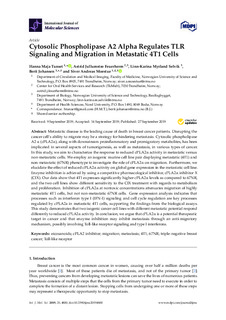| dc.contributor.author | Tunset, Hanna Maja | |
| dc.contributor.author | Feuerherm, Astrid Jullumstrø | |
| dc.contributor.author | Selvik, Linn-Karina M. | |
| dc.contributor.author | Johansen, Berit | |
| dc.contributor.author | Moestue, Siver Andreas | |
| dc.date.accessioned | 2019-10-02T05:56:13Z | |
| dc.date.available | 2019-10-02T05:56:13Z | |
| dc.date.created | 2019-09-18T14:36:54Z | |
| dc.date.issued | 2019 | |
| dc.identifier.citation | International Journal of Molecular Sciences.2019, 20 (19), . | nb_NO |
| dc.identifier.issn | 1422-0067 | |
| dc.identifier.uri | http://hdl.handle.net/11250/2619683 | |
| dc.description.abstract | Metastatic disease is the leading cause of death in breast cancer patients. Disrupting the cancer cell’s ability to migrate may be a strategy for hindering metastasis. Cytosolic phospholipase A2 α (cPLA2α), along with downstream pro-inflammatory and pro-migratory metabolites, has been implicated in several aspects of tumorigenesis, as well as metastasis, in various types of cancer. In this study, Wwe aimed toat characterizeing the response to reduced cPLA2α activity in metastatic versus non-metastatic cells. We employed an isogenic murine cell line pair displaying metastatic (4T1) and non-metastatic (67NR) phenotype to investigate the role of cPLA2α on migration. Furthermore, we elucidate the effect of reduced cPLA2α activity on global gene expression in the metastatic cell line. Enzyme inhibition iswas achieved by using a competitive pharmacological inhibitor, cPLA2α inhibitor X (CIX). Our data show that 4T1 expresses significantly higher cPLA2α levels as compared to 67NR, and the two cell lines show different sensitivity to the CIX treatment with regards toing metabolism and proliferation. Inhibition of cPLA2α at non-toxic concentrations attenuates migration of highly metastatic 4T1 cells, but not non-metastatic 67NR cells. Gene expression analysis indicates that processes such as interferon type I (IFN-I) signaling and cell cycle regulation are key processes regulated by cPLA2a in metastatic 4T1 cells, supporting the findings from the biological assays. This study demonstrates that two isogenic cancer cell lines with different metastatic potential respond differently to reduced cPLA2α activity. In conclusion, we argue that cPLA2α is a potential therapeutic target in cancer and that enzyme inhibition may inhibit metastasis through an anti-migratory mechanism, possibly involving Toll-like receptor signaling and type I interferons. | nb_NO |
| dc.language.iso | eng | nb_NO |
| dc.publisher | MDPI | nb_NO |
| dc.relation.uri | //doi.org/10.3390/ijms20194800 | |
| dc.rights | Navngivelse 4.0 Internasjonal | * |
| dc.rights.uri | http://creativecommons.org/licenses/by/4.0/deed.no | * |
| dc.title | Cytosolic Phospholipase A2 Alpha Regulates TLR Signaling and Migration in Metastatic 4T1 Cells | nb_NO |
| dc.type | Journal article | nb_NO |
| dc.type | Peer reviewed | nb_NO |
| dc.description.version | publishedVersion | nb_NO |
| dc.source.volume | 20 | nb_NO |
| dc.source.journal | International Journal of Molecular Sciences | nb_NO |
| dc.source.issue | 19 | nb_NO |
| dc.identifier.doi | 10.3390/ijms20194800 | |
| dc.identifier.cristin | 1726306 | |
| dc.relation.project | Norges forskningsråd: 239940 | nb_NO |
| dc.description.localcode | © 2019 by the authors. Licensee MDPI, Basel, Switzerland. This article is an open access article distributed under the terms and conditions of the Creative Commons Attribution (CC BY) license (http://creativecommons.org/licenses/by/4.0/). | nb_NO |
| cristin.unitcode | 194,65,25,0 | |
| cristin.unitcode | 194,66,10,0 | |
| cristin.unitcode | 194,65,15,0 | |
| cristin.unitname | Institutt for sirkulasjon og bildediagnostikk | |
| cristin.unitname | Institutt for biologi | |
| cristin.unitname | Institutt for klinisk og molekylær medisin | |
| cristin.ispublished | true | |
| cristin.fulltext | original | |
| cristin.qualitycode | 1 | |

